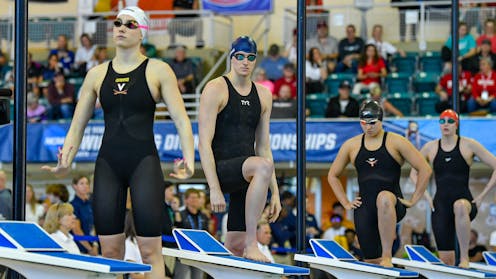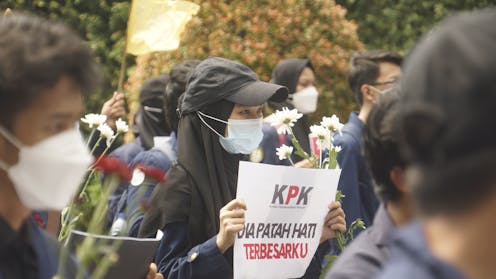Transgender policies struggle to balance fairness with inclusion in women’s college sports
- Written by Amanda Siegrist, Associate Professor of Recreation and Sport Management, Coastal Carolina University

With two executive orders[1] related to school sports[2], President Donald Trump recently tried to settle the growing legal conflict over the right of transgender students to participate in school sports.
That conflict[3], which the Biden administration tried to address[4] and is now taking place in states[5], lower federal courts[6] and the Department of Education[7], will reach the U.S. Supreme Court in its upcoming term.
Supporters of transgender athlete participation argue that gender is a social construct[8], shaped by societal norms and cultural beliefs more so than by biology. They say that people should have the right to self-identify. And they argue that there is no significant threat to fairness[9], safety or opportunity in student sports.
Opponents say that sex and gender identity are distinct[10] from each other. They argue that including biologically born male athletes in women’s sports subverts fairness and threatens the impact of Title IX[11] in women’s sports.
As a professor of sport management[12] with a law degree, I believe the progress in equity, access and participation made by women in sport since the passage of Title IX is at risk if U.S. institutions and legislators depart from the federal law’s original intent: to ensure equal opportunities for women in education settings.
Inclusion versus fairness
Women’s sports are experiencing unprecedented success[13]. In 2024, the NCAA women’s basketball championship final drew a larger TV audience[14] than the men’s final for the first time ever. Sponsorship deals for women’s pro sports have witnessed double-digit growth[15] year over year the past two athletic seasons.
The 2023-2024 academic year saw 235,735 student-athletes participate in NCAA women’s sports. That’s a record high[16].
When Congress passed Title IX in 1972[17], the goal was simple: make sure women have the same educational opportunities as men in school, including in sports programs.
For decades, it worked. Thousands of new teams and opportunities for women emerged, and participation skyrocketed. Before 1972, only about 30,000 women had participated in college sports[18]. Today, 220,000 female athletes compete[19] in NCAA sports.
But while Title IX was expanding access for women athletes[20] in schools, the boundaries of women’s sports were being tested in professional leagues.
In 1977, Renée Richards, a transgender tennis player[22], successfully challenged the United States Tennis Association’s eligibility rules[23] and was allowed to compete in women’s tennis after undergoing sex reassignment surgery.
She played in the 1977 women’s U.S. Open[24] and competed on the women’s professional tour, where she played for four more years before retiring.
Richards was hailed as a pioneer for transgender athletes[25]. But her perspective has shifted over time. In February 2025, Richards said[26]: “I believe that having gone through male puberty disqualifies transgender women from the female category in sports.”
Richards’ perspective underscores the tension between the inclusion of transgender people and maintaining fairness in competition and opportunities for women – a tension that remains at the center of legal debates today.
Court challenges
Courts across the country are now confronting a new wave of challenges to policies on transgender athlete participation from K-12 through college.
In 2021, Becky Pepper-Jackson, a transgender girl, sued the West Virginia Board of Education[27] in federal court over the state’s “Save Women’s Sports Act,” which requires that sport participation in schools must be based on biological sex at birth. Pepper-Jackson argued that the act violated Title IX and the equal protection clause of the Fourteenth Amendment[28] that requires states to treat people in similar situations equally.
A lower court struck down West Virginia’s law as unconstitutional, and in July 2025, the Supreme Court agreed to hear the case[29].
In 2024, several college athletes filed a lawsuit[31] against the NCAA and participating universities. The suit claims the organization violated the athletes’ Title IX rights by allowing transgender swimmer Lia Thomas at the University of Pennsylvania to compete at the national championships in 2022. The plaintiffs argued that competing against athletes who had undergone male puberty created unfair conditions in women’s sports[32].
The suit has not been resolved. But in April 2025, the Department of Education concluded that the University of Pennsylvania violated Title IX[33] by allowing Thomas to swim on the women’s team during the 2021-2022 season. As part of a resolution agreement with the Education Department[34], the university was required to restore to female athletes all individual Division I swimming records broken by biologically born male athletes competing in women’s categories. Per the agreement, the university also issued an apology to the affected athletes[35] and adopted biology-based eligibility standards.
These collegiate cases form part of a larger picture. From high school track meets[36] to NCAA championships[37], the participation of transgender women in female sports has, in the opinion of some, altered outcomes[38], raised safety concerns[39] and challenged the principle of fair play[40].
Studies show that males have strength and size advantages [41] over women. Those differences translate to advantages in sport, even after hormone suppression[42]. To introduce competitive disadvantages in women’s sport threatens the premise of Title IX: to provide women with equal opportunity.
As these court cases unfold, their resolutions will help define standards for transgender participation in women’s sports across educational levels. They underscore the ongoing challenge for institutions and governing bodies to balance inclusion, competitive fairness and compliance with Title IX.
References
- ^ executive orders (www.whitehouse.gov)
- ^ school sports (www.whitehouse.gov)
- ^ That conflict (www.hrc.org)
- ^ the Biden administration tried to address (www.congress.gov)
- ^ taking place in states (www.espn.com)
- ^ lower federal courts (mainepolicy.org)
- ^ the Department of Education (www.ed.gov)
- ^ gender is a social construct (journals.law.harvard.edu)
- ^ argue that there is no significant threat to fairness (www.genderjustice.us)
- ^ say that sex and gender identity are distinct (www.swimmingworldmagazine.com)
- ^ threatens the impact of Title IX (adflegal.org)
- ^ a professor of sport management (www.coastal.edu)
- ^ experiencing unprecedented success (run.outsideonline.com)
- ^ drew a larger TV audience (www.nielsen.com)
- ^ double-digit growth (www.marketingbrew.com)
- ^ a record high (www.ncaa.org)
- ^ Congress passed Title IX in 1972 (guides.loc.gov)
- ^ 30,000 women had participated in college sports (nwlc.org)
- ^ 220,000 female athletes compete (www.ncaa.org)
- ^ Title IX was expanding access for women athletes (www.womenssportsfoundation.org)
- ^ Focus on Sport/Getty Images (www.gettyimages.com)
- ^ a transgender tennis player (www.casemine.com)
- ^ challenged the United States Tennis Association’s eligibility rules (www.oiselle.com)
- ^ played in the 1977 women’s U.S. Open (www.oiselle.com)
- ^ pioneer for transgender athletes (www.bbc.com)
- ^ Richards said (www.si.com)
- ^ sued the West Virginia Board of Education (www.aclu.org)
- ^ Fourteenth Amendment (constitution.congress.gov)
- ^ Supreme Court agreed to hear the case (www.aclu.org)
- ^ Roy Rochlin/Getty Images for Lambda Legal (www.gettyimages.com)
- ^ several college athletes filed a lawsuit (storage.courtlistener.com)
- ^ created unfair conditions in women’s sports (www.espn.com)
- ^ violated Title IX (www.ed.gov)
- ^ resolution agreement with the Education Department (www.ed.gov)
- ^ issued an apology to the affected athletes (www.ed.gov)
- ^ high school track meets (www.themainewire.com)
- ^ NCAA championships (www.espn.com)
- ^ altered outcomes (www.bicycling.com)
- ^ raised safety concerns (sportslitigationalert.com)
- ^ challenged the principle of fair play (www.foxnews.com)
- ^ have strength and size advantages (brzycki.scholar.princeton.edu)
- ^ even after hormone suppression (womeninsport.org)
Authors: Amanda Siegrist, Associate Professor of Recreation and Sport Management, Coastal Carolina University




